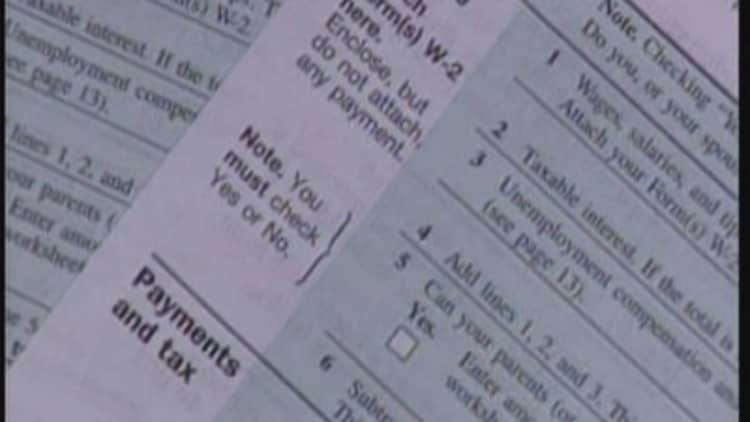
There may be fewer changes to the federal tax code this year than in 2013, but the handful that exist could still impact what you owe. Some, like the new health insurance tax credit, could put more jingle in your pocket, while the expiration of more than four dozen temporary tax breaks that Congress has yet to renew might instead leave students, teachers, retirees and homeowners out in the cold.
First and foremost, said Jackie Perlman, principal tax researcher for The Tax Institute at H&R Block, all taxpayers this year will see a new check box on their 1040 federal tax return, where they'll be required to disclose whether they have had qualified health insurance all year, per the Affordable Care Act mandate.
"That is by far the biggest change this year, because this is the year when the individual mandate goes into effect," said Perlman. "If you purchased insurance through the health-care exchanges, or marketplace, you're going to get a brand-new form in the mail called a 1095A. Keep it in a safe place for filing your return."
If you or your dependents did not obtain minimal essential coverage, you will pay a penalty equal to 1 percent of your yearly household income, or a maximum of $95 per person, on your 2014 federal income tax return, due April 2015. That penalty increases to 2 percent of household income, or $325 per person, in 2015; and 2.5 percent of income, or $695 per person, in 2016.
Read More
A few exemptions exist. You may be able to avoid the penalty, for example, if you are uninsured for fewer than three months out of the year, if the lowest-priced coverage available to you exceeds 8 percent of your income or you don't file a tax return because your income is too low.
Taxpayers with moderate income who obtain their health insurance through the Health Insurance Marketplace may also be eligible for a new premium tax credit to help defray the cost of coverage. Determining eligibility, however, is complicated and is calculated based on household income, the number of exemptions you already claim and the federal poverty line for your family size.
Mark Luscombe, principal tax analyst for tax analysis company Wolters Kluwer, CCH, also reminds taxpayers with foreign assets to be extra vigilant this year with compliance.
U.S. citizens and resident aliens, including those with dual citizenship who have lived or worked abroad during part of the year, have long been required to report any worldwide income, including income from foreign trusts and foreign bank and securities accounts.
Read More
In most cases, affected taxpayers must fill out and attach Schedule B to their tax returns. They may also have to fill out and attach Form 8938, Statement of Foreign Financial Assets.
"That has been in effect for awhile now, but new this year is the reporting requirement imposed on foreign financial institutions," said Luscombe. "Be aware that a lot more information is likely to be coming to the [Internal Revenue Service] from foreign firms about U.S. account holders, so it's best to report voluntarily before the IRS finds you."
Tax extenders expire
Another new twist for 2014 is the uncertainty surrounding $85 billion worth of temporary tax breaks for individuals and businesses, also called extenders, that expired on Dec. 31, 2013.
In years past, Congress has reinstated those credits retroactively in the final weeks of the year, sometimes even waiting until January of the following year. And, indeed, there is a Senate bill aimed at doing just that.
But Luscombe said that bill is now stalled until after the November congressional elections, leaving millions of taxpayers in limbo.
"It seems every couple of years, we face this situation, and Congress eventually extends [temporary credits], but that may not happen until after the midterm election—or at all," he said.
Read MoreTime to reform the tax code?
Among the expired tax breaks are the commuter subsidy for riding mass transit, which fell to $130 from $245; the 10 percent tax credit for building an energy-efficient home and purchasing energy-efficient appliances; and a $250 deduction for teachers who pay out of pocket for classroom expenses.
Gone, too, is the above-the-line deduction—meaning you need not itemize to claim it—for qualified higher-education expenses, often referred to as the tuition and fees deduction. The tax break allowed taxpayers with modified adjusted gross income of $80,000 or less ($160,000 for joint filers) to claim up to $4,000 of their own qualified tuition and related expenses, or the tuition of a spouse or dependent.
Read MoreGay pilot? Muslim quarterback? Meet your advisor
One of the most far-reaching extenders to expire, however, is the state and local general sales-tax deduction. Taxpayers who itemize have previously been permitted to subtract either their state income tax or their state sales tax in calculating their federal taxable income, but the sales-tax deduction was never made permanent.
Its expiration, along with the 54 other tax breaks this year, means those who live in states with no state income tax, like Texas and Florida, have neither write-off available.

More than 8 million taxpayers claimed the deduction for state and local general sales taxes in 2012, said Perlman.
Retirees should also be warned that one of the most popular ways to donate to charity—donating directly from their individual retirement accounts, thereby reducing their tax burden—will be lost if the extender bill is not approved.
Taxpayers who are 70½ or older will no longer be permitted to exclude up to $100,000 per year from gross income by donating directly from their IRAs, or count that qualified charitable distribution as their required minimum distributions.
Read MorePay off student debt before retiring
Lastly, tax relief for homeowners who are underwater on their loan, meaning their house is worth less than they owe on their mortgage, has also disappeared.
Those still struggling in the wake of the housing crisis will no longer be able to write off up to $2 million of any portion of their mortgage debt that gets forgiven by their bank. That amount will instead be treated as taxable income.
Taxpayers this year should be prepared to disclose on their federal tax form whether they obtained qualified health insurance coverage and accurately report any foreign income they received. They should also brace themselves for the possible loss of 55 tax breaks that may hit close to home.




